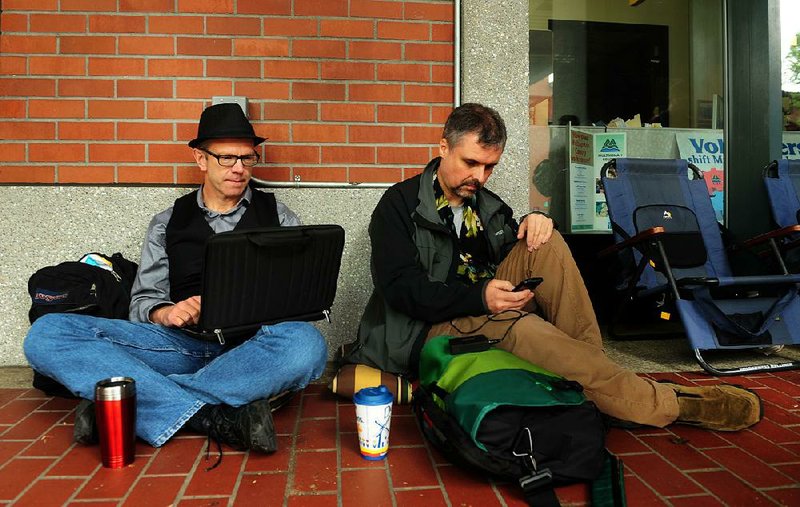SAN FRANCISCO -- Oregon's gay-marriage ban, which wasn't defended by state officials, was struck down Monday by a federal judge, adding to a spate of court victories across the country for supporters of same-sex unions.
U.S. District Judge Michael McShane in Eugene, Ore., ruled that the law violates the Constitution. He said his order permanently blocking the ban "shall be effective immediately upon filing."
Jubilant couples rushed to tie the knot after Monday's ruling, including some who stood in line at the county building in Portland for hours to get a marriage license.
"It's the final step to be truly a family," said Patty Reagan, who took the day off to wed her domestic partner, Kelly. "Everyone else takes for granted that they have this right."
A wave of litigation challenging state same-sex marriage bans was unleashed by a Supreme Court decision in June striking down a measure that limited federal recognition to marriages between a man and a woman. Gay marriage has now been deemed lawful in 18 states and the District of Columbia.
Rulings that have struck down bans in several states have been put on hold while appeals are pursued. Last week, the Arkansas Supreme Court suspended a lower court's ruling that found the state's ban on same-sex marriages unconstitutional.
McShane said that while he knows opposition to gay marriage on moral grounds is tied to a historic belief that being gay is wrong, the U.S. Constitution protects the "minority" that is affected by these beliefs as well as the expression of those viewpoints.
"Generations of Americans, my own included, were raised in a world in which homosexuality was believed to be a moral perversion, a mental disorder, or a mortal sin," the judge wrote in his ruling. "I can remember that one of the more popular playground games of my childhood was called 'smear the queer,' and it was played with great zeal and without a moment's thought to today's political correctness."
McShane is one of nine openly gay U.S. judges, according to the Human Rights Campaign, a gay-rights group. He said at a hearing in April that he and his partner didn't intend to marry, according to court filings. His recusal hasn't been sought, according to the filings.
Oregon Attorney General Ellen Rosenblum, a Democrat, said in February that she wouldn't defend the state's ban on gay weddings, because the law "cannot withstand a federal constitutional challenge under any standard of review." McShane on Wednesday refused to allow an anti-gay marriage organization to intervene in the case and defend the state's ban.
McShane's ruling in Oregon follows a federal judge's decision in Idaho last Tuesday that voided a ban there, while a state court judge in Arkansas on May 9 struck down the state's prohibition on same-sex marriage.
A federal appeals court in Richmond, Va., heard arguments last Tuesday over whether to revive that state's ban, which was struck down in February. The Virginia case is the third to reach a federal appeals court since the Supreme Court's ruling in June. One or more of those cases may return the issue to the Supreme Court, which stopped short of declaring a right to gay marriage.
Gay couples in Oregon sued last year to overturn a measure passed in 2004 that amended the state constitution to exclude same-sex partners from marrying. The measure passed eight months after local officials in Portland issued marriage licenses to 3,000 same-sex couples. Before the constitutional amendment, state law didn't permit or prohibit gay marriage, lawyers for the couples said in court filings.
In other news Monday, a federal judge ordered Utah officials to recognize more than 1,000 same-sex marriages that took place in the state before the U.S. Supreme Court issued an emergency stay.
The American Civil Liberties Union filed a lawsuit in January on behalf of four couples who said the state's decision to freeze benefits for same-sex couples violated their rights. The couples cited concerns such as having a partner legally recognized as a child's second parent.
More than 1,000 gay and lesbian couples married in Utah after a federal judge overturned the state's same-sex marriage ban Dec. 20. Those weddings came to a halt Jan. 6 when the Supreme Court granted the stay.
Utah officials argued that they had no choice but to hold off on benefits until an appeals court rules on the state's same-sex marriage ban.
U.S. District Judge Dale Kimball disagreed in his ruling Monday, saying Utah's decision to freeze all benefits put the couples in an unacceptable legal limbo regarding adoptions, child care and custody, medical decisions, and inheritance, among other things.
He stayed his ruling for 21 days to allow the state an opportunity to appeal the ruling to the 10th U.S. Circuit Court of Appeals in Denver.
Utah officials didn't immediately have any comment.
Information for this article was contributed by Karen Gallo of Bloomberg News, Jonathan J. Cooper, Brady McCombs and Gosia Wozniacka of The Associated Press and by staff writers from the Arkansas Democrat-Gazette.
A Section on 05/20/2014


